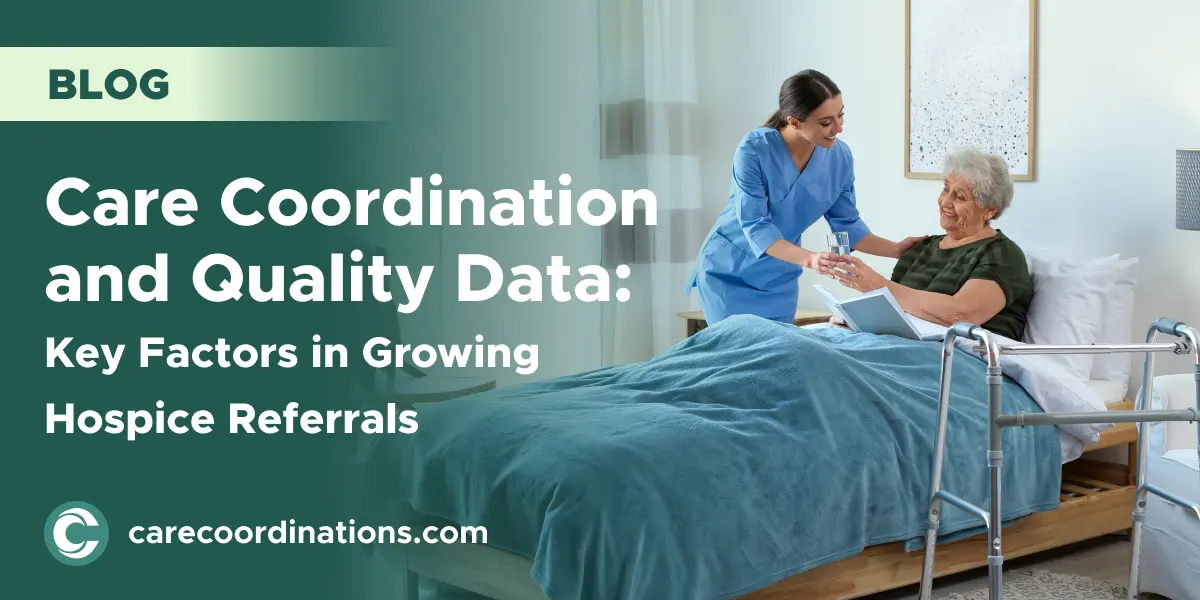Hospice care is critical in providing compassionate care for patients nearing the end of life. Practical strategies to enhance hospice referrals have become paramount as the demand for hospice services grows.
Two key factors that significantly contribute to this process are care coordination and quality data. This article explores how integrating these elements can increase hospice referrals, ultimately improving patient outcomes and satisfaction.
Understanding Hospice Referrals
Hospice referrals are the process of directing patients to hospice care services. They are typically initiated by healthcare providers when a patient is diagnosed with a terminal illness. The significance of hospice referrals lies in ensuring that patients receive the necessary palliative care to manage symptoms and improve their quality of life.
Recent trends indicate a growing recognition of the benefits of hospice care, leading to increased referrals.
According to the National Hospice and Palliative Care Organization (NHPCO), more than 1.55 million patients received hospice care in 2020, highlighting the importance of effective referral processes.
The Role of Care Coordination in Hospice Referrals
Care coordination involves organizing patient care activities and sharing information among all participants concerned with a patient's care to achieve safer and more effective care. In the context of hospice referrals, effective care coordination ensures that patients are seamlessly transitioned from curative to palliative care.
This involves collaboration between various healthcare providers, including primary care physicians, specialists, and hospice teams.
For instance, a case study from a leading hospice care provider demonstrated that implementing dedicated care coordination software significantly improved referral rates and patient satisfaction.
The software facilitated real-time communication and streamlined the referral process, ensuring patients received timely and appropriate care.
Also Read: What Are the Core Benefits of Hospice Care for Patients and Families?
Quality Data in Healthcare
Quality data refers to accurate, timely, and relevant information collected to measure and improve healthcare outcomes. In hospice care, quality data encompasses patient satisfaction scores, symptom management effectiveness, and care delivery efficiency.
The importance of quality data cannot be overstated, as it provides insights into areas needing improvement and helps make informed decisions.
For example, a hospice care organization that consistently monitors and analyzes patient feedback can promptly identify trends and address any issues, leading to better patient care and increased referrals.
Integrating Care Coordination and Quality Data
Combining care coordination with quality data yields numerous benefits, such as improved patient outcomes, increased efficiency, and enhanced communication among healthcare providers.
A notable case study involved a hospice care provider that integrated care coordination software with a quality data management system.
The result was a 20% increase in hospice referrals within six months and improved patient satisfaction scores. The integration allowed for real-time data sharing and analysis, enabling healthcare providers to make informed decisions and coordinate care more effectively.
To successfully integrate these elements, healthcare providers should consider the following steps:
• Implementing robust care coordination software that facilitates seamless communication and task management.
• Utilizing hospice management software that includes comprehensive data collection and analysis features.
• Training healthcare staff on the importance of quality data and using the software effectively.
Technology Solutions for Care Coordination and Quality Data Management
The advent of technology has revolutionized the way healthcare providers manage care coordination and quality data. Various hospice software solutions offer comprehensive features to enhance care delivery and data management. For example, hospice management software like Brightree Hospice & Home Health provides tools for patient care management, billing, and compliance all in one platform.
Similarly, care coordination software like Caremerge offers solutions to streamline communication and task management among care teams.
When selecting a technology solution, healthcare providers should look for features such as:
• Real-time communication capabilities
• Data analytics and reporting tools
• Integration with electronic health records (EHR)
• User-friendly interfaces
Adopting these solutions can significantly improve hospice referrals by ensuring that patients receive timely and coordinated care.
Also Read: Strategies for Effective Hospice Value-Based Insurance Design (VBID) Partnerships
Best Practices for Enhancing Hospice Referrals
To effectively enhance hospice referrals, healthcare providers should focus on improving care coordination and ensuring high-quality data collection and management. Some best practices include:
Improving Care Coordination:
• Establishing clear communication channels among healthcare providers
• Conducting regular training sessions for staff on care coordination practices
• Using care coordination solutions to streamline workflows
Ensuring High-Quality Data Collection and Management:
• Implementing standardized data collection methods
• Conducting regular data audits to ensure accuracy and completeness
• Utilizing hospice software solutions to manage and analyze data effectively
Collaboration with Referral Sources:
• Building strong relationships with hospitals, clinics, and other referral sources
• Educating referral sources about the benefits of hospice care
• Providing easy-to-use referral tools and processes
Patient and Family Engagement:
• Involving patients and families in care decisions
• Providing clear and compassionate communication
• Offering educational resources about hospice care
Challenges and Solutions
Despite the benefits, integrating care coordination and quality data can present challenges, such as resistance to change, data privacy concerns, and ongoing staff training. However, these challenges can be overcome by implementing robust and flexible software solutions, fostering a culture of continuous improvement, and prioritizing staff education.
For example, a hospice care provider facing resistance to new technology implemented a comprehensive training program and established a feedback loop to address concerns promptly. This approach increased staff adoption of the new care coordination software and improved referral rates.
Also Read: Analysis of Why Advanced Reporting is Vital in Hospice Care Software
Boost Your Hospice Referrals: Implement Quality Care Coordination Today!
Care coordination and quality data are essential components in growing hospice referrals. By effectively integrating these elements, healthcare providers can improve patient outcomes, enhance operational efficiency, and increase referral rates.
Advanced hospice management software and care coordination solutions play a crucial role in this process. Healthcare providers are encouraged to adopt these practices and leverage technology to deliver better patient care and support.


